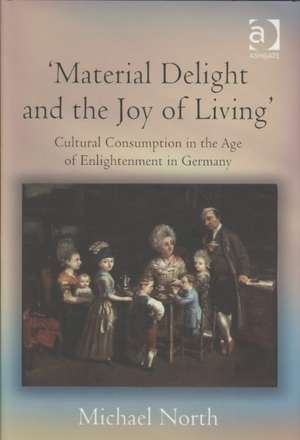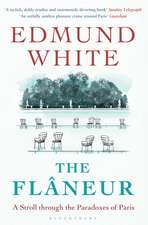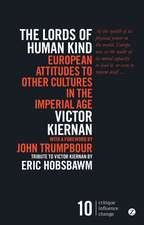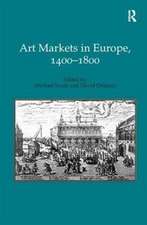'Material Delight and the Joy of Living': Cultural Consumption in the Age of Enlightenment in Germany
Autor Michael Northen Limba Engleză Hardback – 17 oct 2008
Preț: 1054.71 lei
Preț vechi: 1286.24 lei
-18% Nou
Puncte Express: 1582
Preț estimativ în valută:
201.83€ • 210.99$ • 170.56£
201.83€ • 210.99$ • 170.56£
Carte tipărită la comandă
Livrare economică 06-20 martie
Preluare comenzi: 021 569.72.76
Specificații
ISBN-13: 9780754658429
ISBN-10: 0754658422
Pagini: 288
Dimensiuni: 156 x 234 x 18 mm
Greutate: 0.45 kg
Ediția:1
Editura: Taylor & Francis
Colecția Routledge
Locul publicării:Oxford, United Kingdom
ISBN-10: 0754658422
Pagini: 288
Dimensiuni: 156 x 234 x 18 mm
Greutate: 0.45 kg
Ediția:1
Editura: Taylor & Francis
Colecția Routledge
Locul publicării:Oxford, United Kingdom
Cuprins
Contents: Foreword; Introduction: the 18th century - an age of cultural consumption; Books and reading; Travel and the culture of travel; Fashion and luxury; The culture of domestic interiors; Gardens and country houses; Art and taste; Musical culture; Theatre and opera; The new stimulants and sociability; Conclusion: cultural consumption and identity; Notes; Select bibliography and archival sources; Index.
Recenzii
’How a book can be both compendious and richly detailed remains mysterious, but Michael North’s new survey of consumer culture in eighteenth-century Germany admirably accomplishes the feat. It is not a long book, even allowing for the dense layout, but it includes a wealth of information and ideas. A smooth and clear translation ... it should be accepted as a stimulating contribution to such debates and not just as a work of synthesis.’ English Historical Review ’With a series of brief investigations of an array of objects like books, residential furnishings, and hot beverages, North argues convincingly that Germany participated in the dramatic surge in consumption more typically associated with cultural capitals like London and Paris. ... North begins the important process of exploring European consumption outside more familiar metropolitan areas... will likely inspire additional scholarship in this area. ... Recommended.’ Choice ’As a synthesis of secondary scholarship that is also grounded in primary research, North’s study provides a much-needed German counterpart to Brewer’s work on eighteenth-century England and that of Daniel Roche on the French Old Regime. The writing is crisp, the exposition lucid, the pace brisk. These qualities, which speak both to North’s skills as a writer and to Pamela Selwyn’s fluid and felicitous translation, make for a volume that will be read with pleasure by scholars and students alike.’ German History ’... anyone interested in the commercial potential of creativity, or in eighteenth-century German material culture, will find this volume both broad in scope and helpful in mapping out the scale of change.’ Enlightenment and Dissent
Notă biografică
Michael North is Professor of Modern History at the Ernst Moritz Arndt University Greifswald, Germany
Descriere
Eighteenth-century Europe witnessed a commercialisation of culture as the marketing of culture became separated from its production and new cultural entrepreneurs entered the stage. Cultural consumption also played a substantial role in creating social identity. In this book, Michael North systematically explores this field for the first time in regard to the European Continent, and especially to eighteenth-century Germany. Chapters focus on the new forms of entertainment - concerts, theatre, opera, reading societies and traveling - on the one hand and on the new material culture - fashion, gardens, country houses and furniture - on the other.









